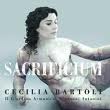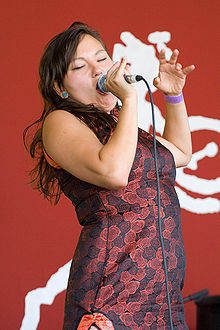 The marketing of classical music artists and their projects has gone from staid to sexy to sensationalist over the last decade or so. But Italian mezzo-soprano Cecilia Bartoli may have taken things a little too far with the packaging of her soon-to-be-released album Sacrificium. Dedicated to exploring the work of the great Italian castrati of the 17th and 18th centuries, the album features Bartoli’s interpretations of music by the likes of Nicola Porpora, Antonio Caldara, Francesco Araia and Carl Heinrich Graun as well as bonus tracks by Riccardo Broschi, Handel and Geminiano Giacomelli.
The marketing of classical music artists and their projects has gone from staid to sexy to sensationalist over the last decade or so. But Italian mezzo-soprano Cecilia Bartoli may have taken things a little too far with the packaging of her soon-to-be-released album Sacrificium. Dedicated to exploring the work of the great Italian castrati of the 17th and 18th centuries, the album features Bartoli’s interpretations of music by the likes of Nicola Porpora, Antonio Caldara, Francesco Araia and Carl Heinrich Graun as well as bonus tracks by Riccardo Broschi, Handel and Geminiano Giacomelli.
Bartoli’s approach to the material is wildly exciting albeit a little to frenetic for my taste. Every virtuostic run goes off like machine-gun fire in my ear. But taken in small doses, it’s inspiring rather than exhausting music.
What’s puzzling, hilarious and in pure bad taste, though, is the way in which the project is being marketed in the hardback book that accompanies the CDs. The language is way over-the-top. The first page of the media copy which I received in the mail the other day is blazoned with these words in bold capitals: “THE SACRIFICE OF HUNDREDS OF THOUSANDS OF BOYS IN THE NAME OF MUSIC.” Just to make the point even clearer, the opposite page features a giant picture of a pair of surgeon’s scissors.
Even more hilarious and off-putting are the images of the singer scattered throughout the volume. The head is recognizably Bartoli’s. But the vocalist’s face has been superimposed on the trunks of various posturing nude males, decked out in marble Grecian hero statue-style. In one particularly funny image, where an athletically-ripped Bartoli looks like she is jumping a hurdle in a running race with a determined look on her face, the dot over the first letter “i” in the slogan “Eviva il coltellino!” (“long live the knife!”) coyly covers the statue’s testicles.
This sort of thing cannot possibly be taken seriously. I do hope Bartoli and her team meant it as a joke.











